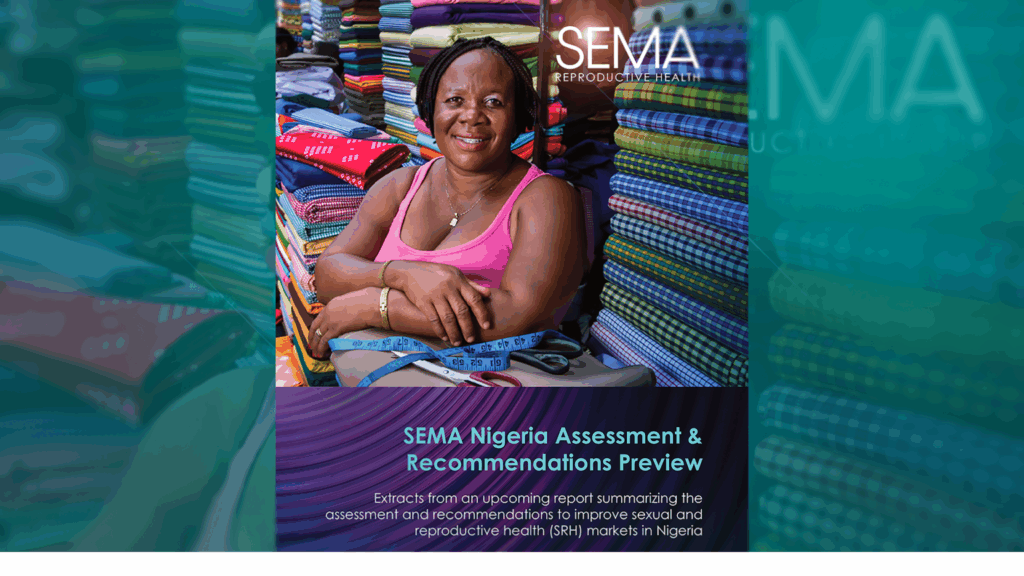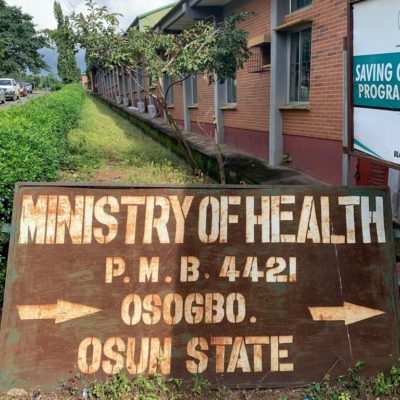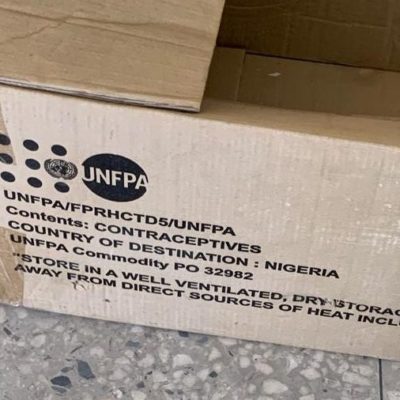Shaping Equitable Market Access (SEMA)

Sexual and Reproductive Health (SRH) products – including contraceptives, medicines to manage pregnancy-related complications – can dramatically improve people’s health and well-being by reducing and maternal deaths. When women and girls can access quality SRH products, they are more likely to stay in school, join the workforce, and help bolster their livelihoods and broader economies – key components to achieving a gender-equal world.
However, persistent weaknesses in SRH markets (e.g high prices and insufficient supply) prevent millions of people from being able to access comprehensive, quality, and affordable SRH products that fit their preferences. The unavailability of contraceptives for instance may force women to forgo contraception altogether, leading to unintended pregnancies and an increased risk of maternal morbidity and mortality.
Roughly, 6.8 million unwanted conceptions take place in Nigeria every year. A national survey conducted in 2018 showed that only 16.6% of women in Nigeria use modern contraceptive methods. To address these gaps, the Shaping Equitable Market Access (SEMA) for Reproductive Health was formed.
SEMA is a new, innovative partnership that aims to transform sexual and reproductive health (SRH) markets so that people everywhere have sustained access to comprehensive, quality, and affordable SRH products. SEMA was announced in July 2021 in France, with country governments from Burkina Faso, Nigeria, and Uganda; financial support from the Children’s Investment Fund Foundation (CIFF), Bill & Melinda Gates Foundation, and the French Ministry for Europe and Foreign Affairs (MEAE); and strategic partnership from the United States Agency for International Development (USAID), the Foreign, Commonwealth, and Development Office of the United Kingdom (FCDO), United Nations Population Fund (UNFPA), and the Reproductive Health Supplies Coalition (RHSC).
In Nigeria, the SEMA Project is executed by the Private Health Sector Alliance of Nigeria (PSHAN), in consortium with PharmAccess Foundation and Halcyon Consulting. Since its inception in August 2022, the Consortium has been working to:
- Gather evidence and provide critical insights into the SRH market landscape. Markets can be challenging to objectively assess and SRH markets have unique features different from other health areas. Using SEMA’s Healthy Markets Framework, the consortium is conducting a market assessment to evaluate national, product, and market enablers with a variety of stakeholders to present an objective picture of market realities.
- Support engagement with local stakeholders to align on priority SRH market problems. While challenges within health markets may be numerous, policymakers must prioritize the most pressing ones. The consortium is working with local stakeholders across the public and private sectors to align on priority market problems in order to guide investment and identify opportunities for how SEMA might invest to tackle local market priorities. In Osun State for instance, consultative stakeholder workshops have been convened drawing key MDAs such as The Ministry of Health, State Primary Health Care Board, and State Health Insurance Agency as well as Partners such as Marie Stopes and DKT to decide where gaps exist in products, supply chains and demand for reproductive health commodities.
- Engage members of the RH TWG and other local partners to expand their understanding of how to shape health markets in Nigeria. Grassroots and subnational structures are important to building strong foundations and governance systems for stronger health markets. Through engagements with Reproductive Health Technical Working Groups and similar structures, PSHAN and the consortium are engaging with local partners to shape and strengthen the broader health market. Illustrative work includes involvement in Osun State’s RH TWG and participating in the Validation and Dissemination of the National Health Market Study 2.0.
Through this project, PSHAN is working to provide better maternal and reproductive healthcare in line with its mandate. A draft report of market shortcomings has been developed and validated by stakeholders and a final report is to be available for dissemination in April 2023.

SRC Security Training
Pellentesque gravida iaculis amet, amet dignissim netus ac eget porttitor malesuada quisque habitant mauris, sed vestibulum convallis vel dignissim arcu lectus nunc vulputate vitae adipiscing amet nisl ultrices quam mattis et blandit amet turpis aliquam etiam commodo sit augue nec sociis platea mauris.

Role of a Security Guard
Diam volutpat risus enim purus dapibus amet cras ipsum non vehicula porttitor aliquam quam pulvinar senectus tortor tellus pellentesque fringilla.

Crowd Control
Facilisis donec tortor, egestas varius magna orci cras magna lobortis orci fermentum at id sit tellus semper elementum maecenas sit.

Powers of Arrest
Elit eu auctor amet eget aenean facilisis elit parturient urna, aliquam diam purus, sit fermentum eget sed nunc.

Patrol Techniques
Turpis enim in lorem lorem egestas feugiat cursus sodales platea nibh aliquam metus cras lacinia mi ultrices id ultrices donec.

Use of Force
Id nec eget vulputate in consectetur montes, enim odio lobortis nam fames tempus vitae, malesuada odio orci quisque.

First Aid
Facilisis ullamcorper faucibus eget vulputate velit ac diam maecenas cursus lobortis massa facilisis amet tellus aliquam.
Join Us
SRC Private Security Training
Amet facilisis viverra sapien odio senectus et in nunc eget volutpat adipiscing


